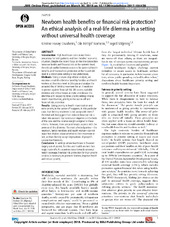| dc.contributor.author | Onarheim, Kristine Husøy | en_US |
| dc.contributor.author | Norheim, Ole Frithjof | en_US |
| dc.contributor.author | Miljeteig, Ingrid | en_US |
| dc.date.accessioned | 2018-04-16T11:15:41Z | |
| dc.date.available | 2018-04-16T11:15:41Z | |
| dc.date.issued | 2018 | |
| dc.identifier.issn | 0306-6800 | |
| dc.identifier.uri | https://hdl.handle.net/1956/17613 | |
| dc.description.abstract | Introduction: High healthcare costs make illness precarious for both patients and their families’ economic situation. Despite the recent focus on the interconnection between health and financial risk at the systemic level, the ethical conflict between concerns for potential health benefits and financial risk protection at the household level in a low-income setting is less understood. Methods: Using a seven-step ethical analysis, we examine a real-life dilemma faced by families and health workers at the micro level in Ethiopia and analyse the acceptability of limiting treatment for an ill newborn to protect against financial risk. We assess available evidence and ethical issues at stake and discuss the dilemma with respect to three priority setting criteria: health maximisation, priority to the worse-off and financial risk protection. Results: Giving priority to health maximisation and extra priority to the worse-off suggests, in this particular case, that limiting treatment is not acceptable even if the total well-being gain from reduced financial risk is taken into account. Our conclusion depends on the facts of the case and the relative weight assigned to these criteria. However, there are problematic aspects with the premise of this dilemma. The most affected parties—the newborn, family members and health worker—cannot make free choices about whether to limit treatment or not, and we thereby accept deprivations of people’s substantive freedoms. Conclusion: In settings where healthcare is financed largely out-of-pocket, families and health workers face tragic trade-offs. As countries move towards universal health coverage, financial risk protection for high-priority services is necessary to promote fairness, improve health and reduce poverty. | en_US |
| dc.language.iso | eng | eng |
| dc.publisher | BMJ | eng |
| dc.relation.ispartof | <a href="http://hdl.handle.net/1956/17619" target="_blank">Priority to the newborn? Real-life priority setting and intra-household resource allocation for newborn health in Ethiopia</a> | |
| dc.rights | Attribution CC BY-NC | eng |
| dc.rights.uri | http://creativecommons.org/licenses/by-nc/4.0/ | eng |
| dc.title | Newborn health benefits or financial risk protection? An ethical analysis of a real-life dilemma in a setting without universal health coverage | en_US |
| dc.type | Peer reviewed | |
| dc.type | Journal article | |
| dc.description.version | publishedVersion | en_US |
| dc.rights.holder | Copyright 2018 The Author(s) | |
| dc.identifier.doi | https://doi.org/10.1136/medethics-2017-104438 | |
| dc.source.journal | Journal of Medical Ethics | |

